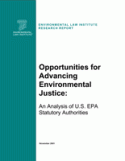
Research Reports
ELI publishes Research Reports available for free download that present the analysis and conclusions of the policy studies ELI undertakes to improve environmental law and policy. These reports contribute to education of the profession and disseminate diverse points of view and opinions to stimulate a robust and creative exchange of ideas. Those publications, which express opinions of the authors and not necessarily those of the Institute, its Board of Directors, or funding organizations, exemplify ELI’s commitment to dialogue with all sectors.
Environmental justice embodies a goal of achieving healthy, sustainable communities for all people. As part of this goal, environmental justice calls for equal protection for all people under the nation’s environmental laws.
Read More >
The environmental risk management challenges facing this nation today require that we break down the barriers that separate the chemical and radiation risk approaches. This process of risk harmonization is aimed at creating a consistent (but not inflexible) framework in which chemical and radiation risks can be managed to protect successfully public health and the environment and draw on the best features of each culture.
Read More >
This paper analyzes benefits and costs of reducing by half the use of coal for electric generation in the United States by the year 2010, making use of the Haiku electricity market model developed and maintained at Resources for the Future. The analysis indicates that the coal generation would be replaced by generation from modern power technologies such as natural gas turbines, together with a small contribution by wind power and other sources.
Read More >Smart growth tools can be useful for small towns and rural communities as well as for major metropolitan areas and rapidly growing localities. States and localities across the country are crafting growth management tools to meet their needs. In most cases, rapidly growing localities and metropolitan areas have felt the strongest need to guide their growth by taking advantage of smart growth tools. Yet, as states put frameworks for smart growth in place, all communities can benefit from regulations and incentives that help them take charge of their future development.
Read More >